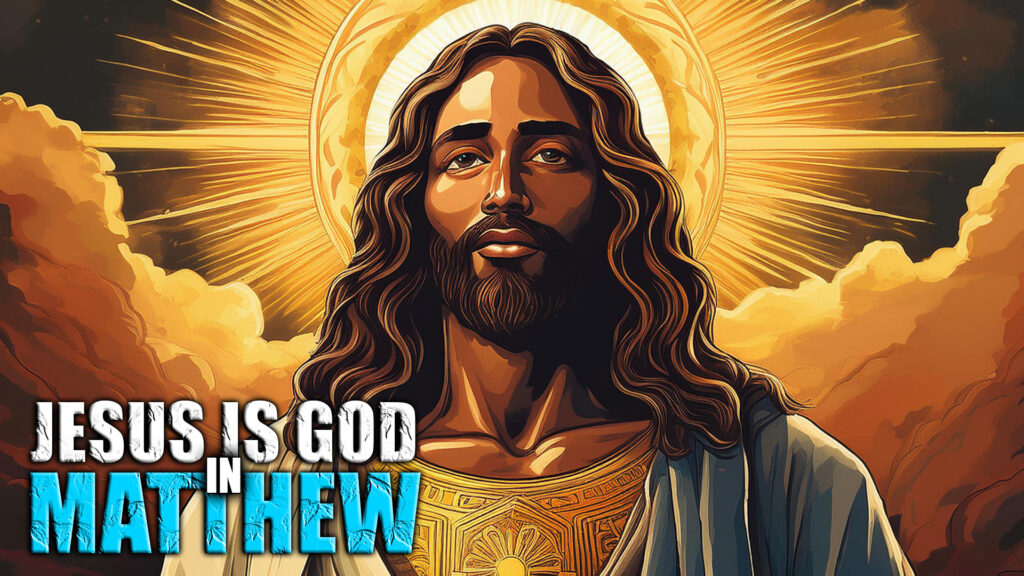
By AC
“I will add to this article over time, showing different verses in Matthew proving Jesus is God”
Matthew 21:15-16
Matthew 21:15-16 is a treasure trove of information showing that Jesus not only claimed to be the most high God, but accepted worship.
15 But when the chief priests and the scribes saw the wonderful things that he did, and the children crying out in the temple, “Hosanna to the Son of David!” they were indignant, 16 and they said to him, “Do you hear what these are saying?” And Jesus said to them, “Yes; have you never read,
“‘Out of the mouth of infants and nursing babies
you have prepared praise’?”
Jesus claims to be Jehovah
In verses 12-17, we see Jesus cleansing the temple, combining quotations from the Old Testament (Isaiah 56:7 and Jeremiah 7:11) to emphasize its sacred purpose. In verses 15-16, children echo the crowd’s earlier praise, crying, “Hosanna to the Son of David!” (verse 9).This declaration of Jesus as the Messianic Son of David angers the chief priests and scribes, who view it as inappropriate worship. When they confront Jesus, questioning the children’s actions, He defends them by quoting Psalm 8:2. In Psalm 8:1-2, Jehovah God is praised by children for His mighty works, portraying Him as the protector and avenger of His people. Jesus parallels this by healing the blind and lame in verse 14, demonstrating God’s compassion and intervention. By applying Psalm 8:1-2, a passage specifically directed at Jehovah, to Himself, Jesus implicitly identifies Himself with Jehovah, the one worthy of praise.
“Hosanna” Is Deeper Than You Thought
What makes this especially compelling is that in the New Testament, “Hosanna” is exclusively directed toward Jesus—a term of praise traditionally used during Jewish festivals to honor Jehovah. In the context of Matthew 21, it would have been the beginning of Passover preparations on the 10th of the month of Nisan (Ex. 12:1-14). Yet, the people of Jerusalem apply it to Jesus, showing they genuinely believed Him to be the long-awaited Messiah from the line of David. This act fulfills the prophecy of Zechariah 9:9, as cited in Matthew 21:5, presenting Jesus as Israel’s divine and mighty King and Savior.
“The repeated word “Hosanna” (ὡσαννά) represents a Greek transliteration of the Aramaic (hôšaʾnāʾ), which means literally “O save” (cf. the LXX, which rather than transliterating the word, translates it σῶσον δή, “save now”; see LXX Ps 117:25 [BH]; cf. 2 Kgdms 14:4 [BH]). The word became in common liturgical usage a cry of jubilation, and in the present passage it amounts to “God save”…or more probably “praise be” to the messianic king (see Fitzmyer; cf. Luke’s translation, δόξα, “glory,” in Luke 19:38). To the first “Hosanna” is added the dative phrase τῷ υἱῷ Δαυίδ, resulting in the meaning “praise/glory be to the Son of David” (cf. 20:30–31)…Children continue this cry in the temple area according to v. 15. To the second “Hosanna” is added the phrase ἐν τοῖς ὑψίστοις, “in the highest,” thus “praise/glory in the highest” (cf. Luke 2:14, 19:38). The word “Hosanna” is drawn from the Hebrew text of Ps 118:25, since the middle line εὐλογομένος ὁ ἐρχόμενος ἐν ὀνόματι κυρίου, “Blessed is the one who comes in the name of the Lord,” is drawn verbatim from the LXX text of that same verse (i.e., Ps 117:25 LXX). In this Psalm, as in the crowds’ acclamation here, there is a note of triumph and of eschatological salvation. This made the psalm, which was in the pilgrims’ minds with the approaching Feast of Passover, appropriate for an application such as the present one. With the entry of the king into Jerusalem, eschatological salvation…” – Hagner, Donald Alfred . Matthew 14-28, Volume 33B (Word Biblical Commentary) (pp. 595-596). Zondervan Academic. Referring to verse 9
What Does Jesus quote?
Jesus quotes Psalm 8:2 (MT/English) or Psalm 8:3 (LXX) to justify the children’s praise of Him, asserting His identity as Jehovah God. This is a bold, divine declaration made without hesitation before the chief priests and scribes.
16) …Matthew’s Greek agrees exactly with that of the LXX of Ps 8:3. The LXX continues with ε῞νεκα τῶν ἐχθρῶν σου, “for the sake of your enemies,” which words, if in Jesus’ mind, would have made the text all the more relevant to the situation. In place of “praise,” the Hebrew text has , ʿoz, “strength,” so that the argument appears to depend on the LXX and go back to Matthew rather than to Jesus. But as France (Jesus and the Old Testament, 251–52) has shown, the Hebrew text of Ps 8:3 could be understood as an ascription of praise (“strength to the Lord”; cf. Pss 29:1; 59:16[MT 59:17]; 68:35[MT 68:34]; 96:7), and thus the LXX may represent a valid interpretation of the Hebrew original. Unknowingly, the children utter the truth of God (cf. the revelation of divine truth to νήπιοι, “babes,” in 11:25, where, however, the subject is the childlikeness of the disciples of Jesus). As the infants referred to in Ps 8:3 spontaneously utter the praise of God’s creation, so these children give appropriate praise to the Son of David.
Hagner, Donald Alfred . Matthew 14-28, Volume 33B (Word Biblical Commentary) (p. 602). Zondervan Academic. Kindle Edition. Referring to verse 16
I believe Hagner made a mistake saying “8:3,” he is referencing verse 2
16) The question of the priests and scribes is presumably (following the statement that they were angry) to be taken as a call for action, like that of the Pharisees who according to Luke 19:39 called on Jesus to silence the messianic acclamations of his disciples. But far from apologizing for the children’s misguided zeal Jesus answers the question with a simple “Yes” and defiantly offers a scriptural justification for it. It comes from LXX Ps 8:3 (EVV 8:2). The psalm speaks of how God the creator silences his enemies by means of “strength” (so the Hebrew) which comes from the mouths of children. “Strength” is often ascribed to God in a formula of praise (e.g. Ps 29:1; 59:16–17; 68:34–35), and when that “strength” issues from mouths it is not hard to see why LXX translated it as “praise.”25 The LXX version makes the relevance of the text to Jesus’ situation in the temple more explicit, but the underlying sense of the Hebrew also is of vindication by what children say, and it is that sense that Jesus’ quotation here depends on.26 The most striking feature of this quotation, however, is the bold assumption by Jesus that what the psalm says about the praise of God (in distinction from mere human beings, Ps 8:4) is applicable to the children’s praise of him. I included this quotation in a study of places where Jesus’ use of OT passages shows that he “was not averse to taking upon himself what in the OT was said of Yahweh,” and commented that in this case “unless he is here setting himself in the place of Yahweh, the argument is a non sequitur.”27 It may be objected that all his argument really requires is the recognition that sometimes children can perceive spiritual truths to which adults are closed, as 11:25 has already declared. But the fact that the children in the psalm vindicated God against his enemies remains strongly suggestive, particularly when this quotation follows an action of Jesus which could be seen as “the Lord” coming to his temple (Mal 3:1; see introductory comments above).28
France, R. T.. The Gospel of Matthew (New International Commentary on the New Testament (NICNT)) (pp. 789-790). Wm. B. Eerdmans Publishing Co. Referring to verse 16
Both Donald Hagner and R.T. France discuss how Jesus’ use of Psalm 8:2 in Matthew 21:16 reveals His claim to divine status, accepting praise that would traditionally be reserved for God (Yahweh). Here’s a simplified summary of their points:
- Jesus’ Use of the Greek Translation (LXX): Hagner and France note that Matthew uses the Greek (Septuagint) version of Psalm 8, where the Hebrew word for “strength” is translated as “praise.” This makes the psalm especially fitting, since it speaks of children praising God. Jesus uses this verse to defend the children’s praise of Him as the “Son of David,” showing He sees their praise as appropriate.
- Jesus as the Recipient of Divine Praise:
- Hagner explains that just as children in the psalm naturally praise God’s greatness, the children in Matthew are unknowingly praising Jesus in a way that acknowledges His divine role. This suggests that Jesus accepts praise meant for God, identifying Himself with Yahweh.
- France adds that Jesus is willing to apply to Himself what was originally directed to God in the Old Testament. By welcoming the children’s praise in the temple—God’s house—Jesus implies He is “the Lord” who has come to His temple, as described in Malachi 3:1.
- The “Non Sequitur” Point:
- France argues that if Jesus were not presenting Himself as God, then quoting this psalm would not make sense, as the psalm is about praise specifically meant for Yahweh. While some might say Jesus is just pointing out that children often understand spiritual truths adults overlook (a theme in Matthew 11:25), France believes the stronger implication is that Jesus is openly accepting worship as God.
Both scholars agree that Jesus’ words and actions here show He is claiming a divine role. By allowing the children’s praise and quoting a psalm about God’s praise, Jesus presents Himself as Yahweh, the rightful recipient of worship, especially significant as this takes place in the temple.





